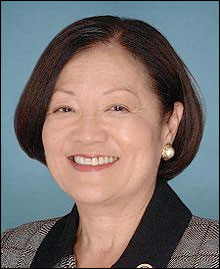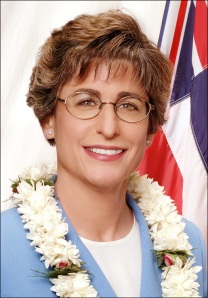Hawaii
The Hawaii US Senate campaign is turning crazy. Now, another new poll reports starkly different results to some others already in the public domain. Ward Research, a Hawaii-based survey research firm, conducted a new poll with an abnormally long sampling period for the Honolulu Star-Advertiser newspaper (Jan. 26-Feb. 5; 771 registered Hawaii voters) and found Rep. Mazie Hirono (D-HI-2) to be enjoying a huge lead in both the Democratic primary and the general elections.
This contrasts with the latest Merriman Group independent study (Jan. 18-19), which showed only a six-point split between Hirono and former Gov. Linda Lingle (R). It further depicted the congresswoman trailing former Rep. Ed Case (D-HI-2) by two points in the intra-party vote.
The Ward numbers give Hirono a huge 57-37 percent lead over Lingle when the two are matched in what many predict could become a hotly contested general election. Additionally, the Democratic congresswoman maintains a 56-36 percent lead over Case, according to this latest survey. For her part, Hirono’s own pollster, The Benenson Strategy Group, released a survey in November posting her to a similar 54-36 percent lead over Case.
But the Merriman poll is not the only one reporting a much different result than Ward. Public Policy Polling’s October survey showed Hirono besting Lingle 48-42%, and the Republican former governor leading Case 45-43%. Hirono’s Democratic primary advantage was just five points over Case, 45-40%.
With so much discrepancy already existing among the pollsters, it is difficult to get a true read on this race. Since President Obama will run extremely well in Hawaii, the Democratic nominee will likely get a boost in the November general election. On the other hand, Lingle’s huge $1.767 million fourth quarter in fundraising puts her ahead of any other candidate, financially. It is clear she will have the monetary backing to run a strong campaign to compliment her almost universal name identification. Expect this race to become competitive, but the intangibles still favor Ms. Hirono and the Democrats.
Massachusetts
The MassInc Polling Group conducted a statewide Senatorial survey (Feb. 6-9; 503 registered Massachusetts voters) for WBUR radio in Boston, a National Public Radio station. They find former Obama Administration Consumer Affairs Advocate Elizabeth Warren (D) leading Sen. Scott Brown (R) 46-43 percent. Several previous polls have also shown Warren to be ahead, and by more than two points.
The data again illustrates how difficult it is for any Republican to win in the Bay State. Despite trailing, Sen. Brown’s favorability ratings are quite high. A full 50 percent of those interviewed say they have a positive opinion of Sen. Brown versus just 29 percent who registered an unfavorable comment. By contrast, Ms. Warren’s ratio is 39:29 percent.
The poll asked eight preference comparison questions about the candidates’ backgrounds, their views toward the middle class, who would perform better on economic issues, etc. Brown scored below Warren on only one substantive issue question, and on that by just one point. By a margin of 32-31 percent, the sampling universe said that Ms. Warren would better relate to the middle class. An additional 21 percent indicated the two candidates were equal in understanding the needs of middle class families.
The only question where Brown trailed by a relatively large percentage (34-24 percent) was in response to which candidate seems to have campaign momentum.
Therefore, despite the favorable reviews, Brown still trails on the ballot test question. These results are similar to those found in Florida, where Rep. Connie Mack IV is challenging Sen. Bill Nelson (D). There, Nelson’s personal numbers appear to be as good as Brown’s, but he too finds himself pitted in a close election battle.
With both candidates being heavily funded – Brown has already raised $8.6 million with $12.9 million in the bank; Warren has gathered slightly more, $8.9 million, but has considerably less, $6.14 million, cash-on-hand – it is clear this campaign will play out over a long course of time. The intangibles definitely favor Warren because a candidate uniting the Democratic Party will be very difficult to derail in one of the most Democratically-loyal states in the entire country. Sen. Brown is the right candidate to hold the seat for his party, but even he may not have enough ability to stem what could possibly be a very strong tide against him.




